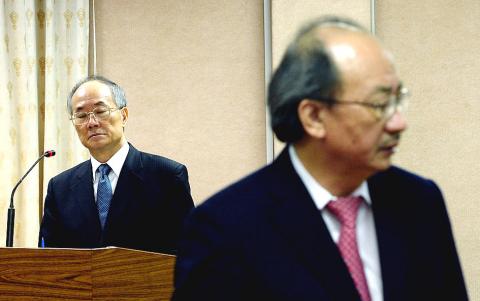Prosecutor-General Huang Shih-ming (黃世銘) came under fire in the legislature yesterday over his handling of Legislative Speaker Wang Jin-pyng’s (王金平) case.
Democratic Progressive Party (DPP) Legislator Wu Ping-jui (吳秉叡) and Taiwan Solidarity Union (TSU) Legislator Hsu Chung-hsin (許忠信) proposed abolishing the Special Investigation Division (SID) of the Supreme Prosecutors’ Office. The bill was reviewed in a meeting of the Judiciary and Organic Laws and Statutes Committee yesterday.
Huang, who attended the meeting, was under fire by legislators over his handling of Wang’s case.

Photo: Lin Cheng-kun, Taipei Times
Chinese Nationalist Party (KMT) Legislator Liao Cheng-ching (廖正井) said Huang violated the law by wiretapping DPP Legislator Ker Chien-ming’s (柯建銘) telephone and reporting the case to President Ma Ying-jeou (馬英九).
“I absolutely support the bill abolishing the SID,” Liao said, becoming the first KMT legislator to back the proposal.
“How long have you wiretapped me?” Ker asked Huang. “How could you violate the Communication Security and Surveillance Act (通訊保障及監察法) by wiretapping me and releasing my phone transcripts to the public?”
“Other legislators and I all suspected we have been wiretapped for years,” Ker said.
“The monitoring of Ker’s telephone was authorized by the Taipei District Court, starting on May 16 and finishing on Sept. 5,” Huang said.
“As the SID said before, the case originated when we probed bribery allegations involving former Taiwan High Court judge Chen Jung-ho (陳榮和). We found Ker might be involved and wiretapped Ker’s phone in accordance with the law,” he said.
“How many times have you violated the law by reporting on the investigation to President Ma?” Ker asked Huang.
“I went to Ma’s residence twice to report on the matter involving Wang. The first time was on Aug. 31 and the second was on Sept. 1,” Huang said.
“I reported to President Ma after the investigation was finished and I concluded it was only administrative misconduct,” Huang said.
“Because public figures at the highest level were involved in the lobbying, I had the responsibility to report it to the head of the state,” Huang said, citing Article 44 of the Constitution, which stipulates how the president must handle a consultation in case of disputes between two or more branches of government.
Huang also revealed that the SID wiretapped Taiwan High Prosecutors’ Office Prosecutor Lin Shiow-tao (林秀濤) during the investigation.
The alleged misconduct was raised by the SID at a press conference on Sept. 6, during which it said that Ker, after being found not guilty on June 18 of embezzling funds from Formosa Telecom Investment Co (全民電通) in 1997, allegedly asked Wang to lobby then-minister of justice Tseng Yung-fu (曾勇夫) and Taiwan High Prosecutors’ Office Head Prosecutor Chen Shou-huang (陳守煌) to use their influence to persuade Lin not to appeal the case with the Supreme Court.

CHAOS: Iranians took to the streets playing celebratory music after reports of Khamenei’s death on Saturday, while mourners also gathered in Tehran yesterday Iranian Supreme Leader Ayatollah Ali Khamenei was killed in a major attack on Iran launched by Israel and the US, throwing the future of the Islamic republic into doubt and raising the risk of regional instability. Iranian state television and the state-run IRNA news agency announced the 86-year-old’s death early yesterday. US President Donald Trump said it gave Iranians their “greatest chance” to “take back” their country. The announcements came after a joint US and Israeli aerial bombardment that targeted Iranian military and governmental sites. Trump said the “heavy and pinpoint bombing” would continue through the week or as long

TRUST: The KMT said it respected the US’ timing and considerations, and hoped it would continue to honor its commitments to helping Taiwan bolster its defenses and deterrence US President Donald Trump is delaying a multibillion-dollar arms sale to Taiwan to ensure his visit to Beijing is successful, a New York Times report said. The weapons sales package has stalled in the US Department of State, the report said, citing US officials it did not identify. The White House has told agencies not to push forward ahead of Trump’s meeting with Chinese President Xi Jinping (習近平), it said. The two last month held a phone call to discuss trade and geopolitical flashpoints ahead of the summit. Xi raised the Taiwan issue and urged the US to handle arms sales to

State-run CPC Corp, Taiwan (CPC, 台灣中油) yesterday said that it had confirmed on Saturday night with its liquefied natural gas (LNG) and crude oil suppliers that shipments are proceeding as scheduled and that domestic supplies remain unaffected. The CPC yesterday announced the gasoline and diesel prices will rise by NT$0.2 and NT$0.4 per liter, respectively, starting Monday, citing Middle East tensions and blizzards in the eastern United States. CPC also iterated it has been reducing the proportion of crude oil imports from the Middle East and diversifying its supply sources in the past few years in response to geopolitical risks, expanding

Pro-democracy media tycoon Jimmy Lai’s (黎智英) fraud conviction and prison sentence were yesterday overturned by a Hong Kong court, in a surprise legal decision that comes soon after Lai was jailed for 20 years on a separate national security charge. Judges Jeremy Poon (潘兆初), Anthea Pang (彭寶琴) and Derek Pang (彭偉昌) said in the judgement that they allowed the appeal from Lai, and another defendant in the case, to proceed, as a lower court judge had “erred.” “The Court of Appeal gave them leave to appeal against their conviction, allowed their appeals, quashed the convictions and set aside the sentences,” the judges